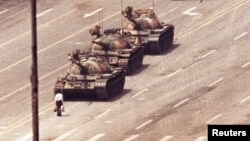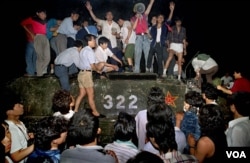The U.S. on Monday saluted "the heroes of the Chinese people who bravely stood up" against their government's deadly crackdown on dissent at the Tiananmen Square massacre 30 years ago.
Secretary of State Mike Pompeo said in a statement that the protesters, hundreds of whom were killed by soldiers and tanks in the June 4, 1989, protest, "served as an inspiration to future generations calling for freedom and democracy around the world, beginning with the fall of the Berlin Wall and the end of communism in Eastern Europe in the months that followed."
He said 'the events of 30 years ago still stir our conscience." He called on Beijing "to make a full, public accounting of those killed or missing to give comfort to the many victims of this dark chapter of history. Such a step would begin to demonstrate the Communist Party's willingness to respect human rights and fundamental freedoms."
He said that in the three decades since the incident was televised throughout the world, the U.S. had "hoped that China's integration into the international system would lead to a more open, tolerant society."
But Pompeo said "those hopes have been dashed. China's one-party state tolerates no dissent and abuses human rights whenever it serves its interests. Today, Chinese citizens have been subjected to a new wave of abuses, especially in Xinjiang, where the Communist Party leadership is methodically attempting to strangle Uighur culture and stamp out the Islamic faith, including through the detention of more than one million members of Muslim minority groups."
He added, "Even as the party builds a powerful surveillance state, ordinary Chinese citizens continue to seek to exercise their human rights, organize independent unions, pursue justice through the legal system, and simply express their views, for which many are punished, jailed and even tortured."
China on Sunday defended its harsh suppression of the Tiananmen pro-democracy protesters, saying it was "the correct policy."
Defense Minister Wei Fenghe, in answering a question posed at a conference in Singapore, said "there was a conclusion to that incident. That was a political turmoil that the central government needed to quell. The government was decisive in stopping the turbulence. That was the correct policy."
Wei's defense of the Chinese government's brutal treatment of the protesters was a rare acknowledgement of the incident that occurred after seven weeks of demonstrations by students and workers demanding democratic change and the end of corruption.
Government soldiers and tanks chased and killed hundreds of protesters, possibly more than 1,000, although the exact number of deaths remains unknown.
Wei questioned why critics still say that China "did not handle the incident properly."
"The 30 years have proven that China has undergone major changes," he said. Wei said because of Beijing's response at the time, "China has enjoyed stability and development."
But inside China, online censors have scrubbed mention of the Tiananmen crackdown from social media, removing articles, comments and pictures. Discussions of the suppression of the protests is taboo in China, with authorities warning and rounding up activists, lawyers and journalists each year as the anniversary approaches.






